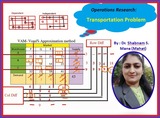
Transportation Problem solution using LCM -Least Cost Method or MMM- Matrix Minima Method

Transportation Problem solution using LCM -Least Cost Method or MMM- Matrix Minima Method

LaTeX is a standard tool for writing research articles, research papers, dissertations, and reports. It is widely used in fields such as computer science, mathematics, engineering, chemistry, and physics.

Learning Culture Through City Soundscapes
A Teacher Handbook
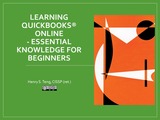
This book titled “Learning QuickBooks® Online - Essential Knowledge for Beginners, 2nd Edition” is written for people without a college degree. The intent is to help people acquire the essential knowledge on QuickBooks with minimum technology education. The book starts from the setup of QuickBooks Online via the web. Readers are taught to use a free version of QuickBooks Online for learning purposes. The learning tool with some restrictions is provided by Intuit Inc. at no cost to learners. The content in this book uses a large number of visual graphics to ease the learning curve. Completion of the QuickBooks Online study in this book can be accomplished in a self-paced learning manner outside of the classroom.
It is hoped that this book will broaden the career development of many office workers including administrative assistants. This can be accomplished by improving their technology skills towards jobs in data entry, bookkeeping, and financial management for small and large businesses.
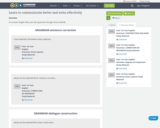
It is to learn English when you learn grammar through funny methods
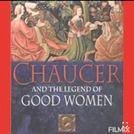
Chaucer describes the virtuous women
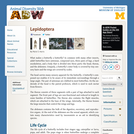
Lepidoptera: Information
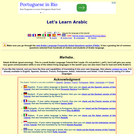
Let's Learn Arabic is a tutorial designed to introduce users to reading and writing in Arabic. The tutorial is composed of a total of five lessons and begins with a brief historical background about the language. The first and second lessons provide an introduction to the letters that make up the alphabet. The next three give a number of example demonstrating how to combine the letters into words. Audio files demonstrating the names of all of the letters are provided.
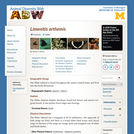
Limenitis arthemis: Information
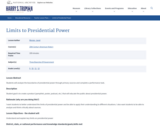
Through this lesson, students will analyze the boundaries of presidential power through primary sources and complete a performance task.
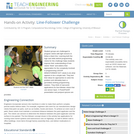
Student groups are challenged to program robots with light sensors to follow a black line. Learning both the logic and skills behind programming robots for this challenge helps students improve their understanding of how robots "think" and widens their appreciation for the complexity involved in programming LEGO® MINDSTORMS® NXT robots to do what appears to be a simple task. They test their ideas for approaches to solve the problem and ultimately learn a (provided) working programming solution. They think of real-world applications for line-follower robots that use sensor input. A PowerPoint® presentation and pre/post quizzes are provided.
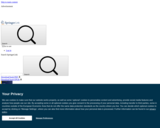
This open access book addresses four standard business school subjects: microeconomics, macroeconomics, finance and information systems as they relate to trading, liquidity, and market structure. It provides a detailed examination of the impact of trading costs and other impediments of trading that the authors call “frictions”. It also presents an interactive simulation model of equity market trading, TraderEx, that enables students to implement trading decisions in different market scenarios and structures. Addressing these topics shines a bright light on how a real-world financial market operates, and the simulation provides students with an experiential learning opportunity that is informative and fun.
Each of the chapters is designed so that it can be used as a stand-alone module in an existing economics, finance, or information science course. Instructor resources such as discussion questions, Powerpoint slides and TraderEx exercises are available online.

Summary of little girls are wiser than men
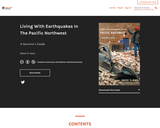
A Survivor's Guide
Short Description:
The third edition, updated nearly three decades later, tells the earthquake story of the Pacific Northwest. (This includes the west coast of Canada, and perhaps from a Canadian perspective, it should be the Pacific Southwest.) The book presents the evidence for earthquakes, the location of major faults, the danger from tsunamis, the importance of ground conditions, and what we as individuals and as taxpayers and voters can do to make our homes and our communities safer from earthquakes. There are lessons from the Northwest experience to be learned elsewhere in the United States, Canada, and other parts of the world where the earthquake threat is greater than that perceived by the general public. Data dashboard
Long Description:
In this expanded new edition of Living with Earthquakes, Robert Yeats, a leading authority on earthquakes in California and the Pacific Northwest, describes the threat posed by the Cascadia Subduction Zone, a great earthquake fault which runs for hundreds of miles offshore from British Columbia to northern California. New research reveals subtle movements on the deepest part of this fault every 14-15 months — building up strain toward the next major earthquake.
Combining cutting-edge research with practical safety information, Living with Earthquakes: introduces new information about the danger from faults beneath major Northwest cities: the Seattle Fault, Tacoma Fault, and Portland Hills Fault explores such topics as earthquake forecasting, catastrophe insurance, tsunamis, soil liquefaction, and seismic waves in Northwest lakes caused by Alaskan earthquakes reviews earthquake preparedness and disaster response in the aftermath of the 2001 Nisqually earthquake, the worst natural disaster in Washington’s history suggests actions that citizens can take to protect their families and homes
An essential guide for anyone interested in understanding earthquake science or in preparing for the next earthquake, this book is also a call to action. Vivid descriptions of recent disasters — including the great tsunami that swept down the Northwest coast in 1964, the 1993 Oregon earthquakes, and the 2001 Nisqually earthquake — underscore the urgent need for better earthquake planning and awareness.
Word Count: 156810
(Note: This resource's metadata has been created automatically by reformatting and/or combining the information that the author initially provided as part of a bulk import process.)
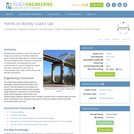
Students take a hands-on look at the design of bridge piers (columns). First they brainstorm types of loads that might affect a Colorado bridge. Then they determine the maximum possible load for that scenario, and calculate the cross-sectional area of a column designed to support that load. Choosing from clay, foam or marshmallows, they create model columns and test their calculations.
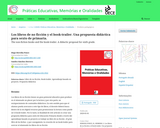
Los libros de no ficción tienen un gran potencial educativo pues produce en el alumnado un placer por la lectura y por otra parte, un enriquecimiento de contenidos didácticos. En este sentido para que el alumno pueda acercarse a este tipo de libros, el docente deberá busca dentro de la era digital recursos para promocionar la lectura como puede ser el book-trailer. Por lo tanto, la finalidad de este artículo es crear una propuesta didáctica para sexto de Educación Primaria donde a través del aprendizaje basado en proyecto se trabaje un libro de no ficción –El gran libro de los bichos– y por consiguiente, la creación de un book-trailer para acercar al alumnado los libros de no ficción
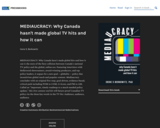
Short Description:
MEDIAUCRACY: Why Canada hasn't made global hits and how it can is the story of the fiery collision between Canada's national TV policy and the global, online era. Featuring interviews with Hollywood showrunners, award-winning producers, and top policy leaders, it argues for a new goal -- globality -- policy that incentivizes global reach and popular content. Mediaucracy concludes with an original five-step, goal-driven, evidence-based, critical path including POM to COM, G-Score, and PM to AM. Called an "important, timely roadmap to a much-needed policy update," this 21st century tool kit will future-proof Canadian TV policy via the three key words in the TV biz: Audience, audience, audience.
Long Description:
MEDIAUCRACY: Why Canada hasn’t made global hits and how it can is the untold the story of the collision between Canada’s national TV policy and the global, online era. It argues for a new goal — globality — TV policy that incentivizes global reach and popular content. The book makes it case with interviews with top-tier creators, executives, and policy makers; an authoritative value chain analysis; a review of TV policy around the world; and a comprehensive history of Canadian TV policy, including Canada’s 4 recent federal inquiries on the same issue — the impact of digital disruption. MEDIAUCRACY concludes with an original five-step, goal-driven, evidence-based, critical path including POM to COM, G-Score, and PM to AM. Called an “important, timely roadmap to a much-needed policy update,” this 21st century tool kit will future-proof Canadian TV policy via the three key words in the TV biz: Audience, audience, audience.
Word Count: 68024
ISBN: 978-1-77417-023-6
(Note: This resource's metadata has been created automatically by reformatting and/or combining the information that the author initially provided as part of a bulk import process.)
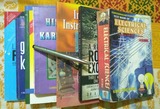
Books can make any one Bright...........start to read.
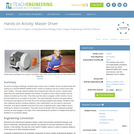
As part of a design challenge, students learn how to use a rotation sensor (located inside the casing of a LEGO® MINDSTORMS ® NXT motor) to measure how far a robot moves with each rotation. Through experimentation and measurement with the sensor, student pairs determine the relationship between the number of rotations of the robot's wheels and the distance traveled by the robot. Then they use this ratio to program LEGO robots to move precise distances in a contest of accuracy. The robot that gets closest to the goal without touching the toy figures at the finish line is the winning programming design. Students learn how rotational sensors measure distance, how mathematics can be used for real-world purposes, and about potential sources of error due to gearing when using rotation sensor readings for distance calculations. They also become familiar with the engineering design process as they engage in its steps, from understanding the problem to multiple test/improve iterations to successful design.